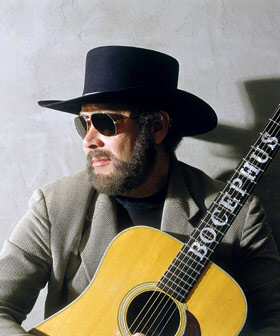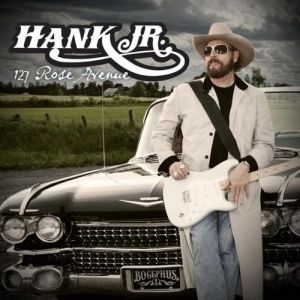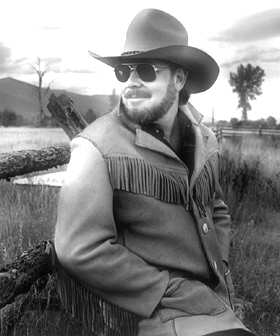DAVE'S DIARY - 16 FEBRUARY 2010 - HANK WILLIAMS JR - CD REVIEW
CD REVIEW - 2010
HANK
WILLIAMS JR
127 ROSE AVENUE (SONY CURB)
BOCEPHUS RETURNS TO HIS ROOTS
"Somewhere in the cradle of the deep south/ magnolias sway in the breeze/ to the lonesome sound of a Red Boned Hound/ howlin' at the moon and the trees/ there's a sad eyed boy, with his guitar/ cuttin' his teeth on the blues/ wishin' on a falling star, at 127 Rose Avenue." - 127 Rose Avenue - Bud McGuire-Kim Williams-Ray Hood.
 |
When
Hank Williams Jr cut his 51st studio album he returned to his roots
- his childhood home in Georgiana, Alabama - for the title track. Hank Sr divorced Audrey on May 29, 1952, and wed second wife Billie Jean Jones Eshlimar on October 28 the same year. |
Life was
not kind for Billie Jean - she wed another country star Johnny Horton
in 1953 and he died just seven years later in a car crash in Texas.
Both Hank and Horton died after gigs at the Skyline Club that opened in
1948 on Dallas Highway, now North Lamar Boulevard, in Austin.
But this is about Hank Jr, now 60, and his childhood home that is now
a country museum.
After a colourful career littered with battles with the bottle and dope,
a near fatal fall at 26 from Ajax Mountain, Montana, on August 8, 1975,
and four failed marriages, he could be excused for gaps in withdrawals
from his memory bank.
Not so the song's writers who update us with the fate of that childhood
home.
Hank Jr ignites the imagery with credible passion as he sings of the presence.
"So a I bought me a ticket at the front door; guess who was there
inside.
I felt his presence through the whole tour/God I swear, he was alive/I
saw the train, I felt the pain/I heard him moanin' the blues/Twenty-nine
years of memories/At 127 Rose Avenue."
DON HELMS - LAST DRIFTIN' COWBOY
"I was one of the lucky few that got to play with him/ when I turned 21 he told me 'son I gonna fill you in/ don't believe that stuff about your dad being bad to the end/ he knew how to have fun, he owned the music, son/ he was a God blessed rambling man." - The Last Driftin' Cowboy - Hank Williams Jr
 |
Hank
Jr borrowed from his dad's Honky Tonk Blues in his evocative tribute
to Don Helms in Last Driftin' Cowboy. Helms, the longest surviving member of Hank Williams forties and fifties band The Drifting Cowboys, also played with Hank Jr. The duo wrote the satirical, irreverent Ballad Of Hank Williams that was on Hank Jr's 1981 album The Pressure Is On. Helms died at 81 on August 11, 2008, from a heart attack and diabetes. The iconic pedal steel guitarist played on albums by three generations of Williams including Hank Jr's sister Jett and son Hank 111. |
Don also
played on Hank's final 1952 sessions and prophetic posthumous hit I'll
Never Get Out Of This World Alive.
Helms adorned more than 100 Hank Williams songs and 10 of his 11 #1 hits.
The octogenarian worked sessions - including Australian singer Catherine
Britt - until the eve of his passing at Skyline Medical Centre in Nashville.
So it was fitting Hank Jr revamped his dad's music in his Helms eulogy.
The singer perfects his tempo change as he sings: "the driftin cowboy
has found his way home."
Hank Jr said his daily walk in the hills of West Tennessee inspired his
Helms tribute.
"I'm out there with a Labrador and a hickory stick," Bocephus
said.
The Last Driftin' Cowboy came right out of the blue on one of these
walks, the words, the melody, everything."
But when Hank Jr honours his dad in his bluesy version of the legend's
hit Long Gone Lonesome Blues he had to use another pedal steel
guitarist - Paul Franklin.
He introduces the song with a quote from Lightning Hopkins about the influence
Hank Sr had on the blues legend and plays two-guitar parts.
RED, WHITE & PINK SLIP BLUES
"I used to love this town and this neighborhood/ the streets were safe, the schools were good/ the mill was hummin' twenty-four seven/ I was formin' on the line, three to eleven/ but eighteen months, two days ago/ the Mill closed down and moved to Mexico." - Red White & Pink Slip Blues - Mark Stephen Jones-Bud Tower
Bocephus
has fleshed out many of his albums with blue-collar anthems and social
comment songs on summary justice.
This is no exception with the singer exploiting the patriotic fervour
of the album's single Red, White & Pink Slip Blues.
It's a similar theme to workers' woes in Australia - instead of jobs being
outsourced north to China and India they are sent south to Mexico.
Hank Jr wrote five songs on this disc but not vitriolic Sounds Like
Justice where summary justice is dispensed to avenge a litany of crimes.
The story is familiar but the characters are new - a child molester scores
a soft sentence from the judge but is killed in his cell.
A verse later the mom and pop storekeepers of 30 years defend their shop
and family with a gun from a previous life in the services.
The message is delivered fully to the tune of Gabriel's Horn and
backing singers Lisa Cochran and Perry Coleman.
Those same back-up singers also embroider Hank Jr's love lament High
Maintenance Woman.
This is standard Hank Jr fodder on a disc destined to be his last for
Curb.
"This is my last album for Mike Curb, and he's history," says
Hank Jr who claims the label has failed to give him the artistic and promotional
backing he deserves.
"We will move onward and upward," he vows.
"You just wait. We'll have a lot to talk about. I've had some recording
ideas that they didn't care for. Well, there's a lot of other labels that
do care about it. We're going to get off this old, dead sinking ship.
One thing about it: You can say, 'the last one he made was damn sure a
gem.' I love 127. We had to do the cover for the album. They didn't do
anything. We did everything. They were going to use a picture of me from
seven years ago when I was 25 pounds heavier. That was going to be the
cover."
And the new cover - well, it's a slim line Hank Jr and guitar standing
in front of his Cadillac with the Bocephus 1 No plate.
GULF SHORE ROAD
"I want to live on Gulf Shore Road/ and lighten up my heavy load/ make all my blues go away/ lookin' across Pelican Bay/ I want to live on fresh seafood/ and never be in a bad mood/ I want to dance with you real slow/ on Moonlight Beach on Gulf Shore Road." - Gulf Shore Road - Hank Williams Jr.
 |
The
singer kicked off his album with rollicking barn burning Farm Song,
replete with bovine imagery and staccato word play. It's maybe Bocephus's belated contribution to the poetry of rap in a Dixie dialect. The singer honours faithful friends and solace in the storms of life in the John Scott Sherrill-Don Poythress song Mighty Oak Trees. That bonding extends in the military mateship of the wheelchair confined benefactor in the Ronald Hellard-Daryl Burgess tune Forged By Fire. Hank Jr replaces hedonism of much of his hell raising music of yore with the idyllic escapism of Gulf Shore Road. |
It's a sibling
of sorts to the simplistic love pleas of his bluegrass romp on All
The Roads featuring The Grascals.
The message is answered when the object of his affection boomerangs in
the latter verses.
Bocephus declares his love of bluegrass is historic.
"I've got my Earl Scruggs Mastertone banjo right here," he boasted.
"People don't realise that part of me. I used to ride my Harley-Davidson
Sportster from the 2131 Apartments on Elm Hill Pike in Nashville over
to Earl Scruggs' house in Madison to get lessons from the master. And
Sonny Osborne of the Osborne Brothers helped me a lot. I had the best
teachers in the world."